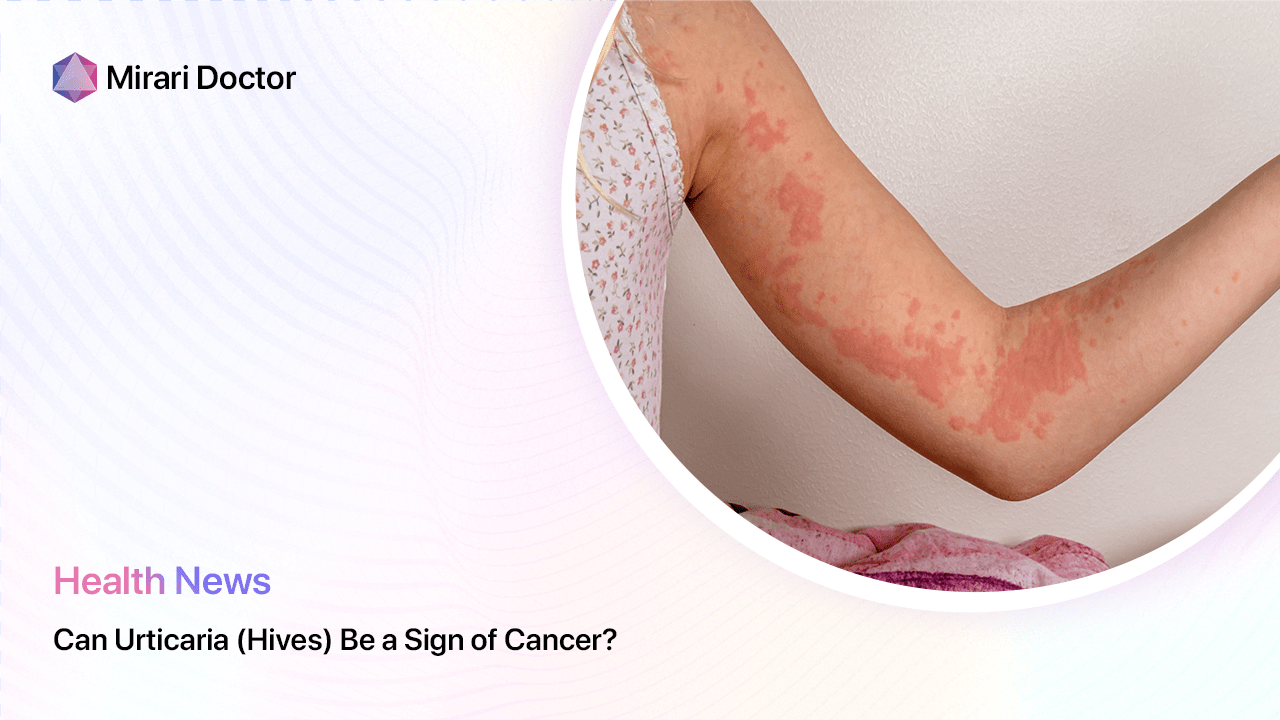
Urticaria, commonly known as hives or wheals, is a common skin condition characterized by raised, itchy, red welts on the skin. It often comes and goes rapidly, with individual welts lasting anywhere from a few hours to a maximum of 24 hours. Though urticaria can be uncomfortable and frustrating to deal with, it is not usually considered a sign of potential cancer.
Types of Urticaria
There are several types of urticaria. The most common are acute and chronic urticaria. Acute urticaria comes on quickly and lasts less than 6 weeks. Chronic urticaria persists longer, in some cases for years.
Cold Urticaria
One specific type to mention is cold urticaria. This involves itchy welts forming on the skin after exposure to cold temperatures, including rain, cold air, or cold water. Facial swellings and hives on the hands are particularly common. Symptoms normally subside once the body returns to normal temperature.
“If hives last more than a day or two or are accompanied by facial swellings, joint pain, chest tightness, wheezing or fainting, seek prompt medical attention.” – American Academy of Allergy Asthma & Immunology (AAAAI)
When to See a Doctor
For regular short-lived cases of hives, medical attention may not be necessary. However, if urticaria persists for longer periods, is severe, or accompanied concerning symptoms like trouble breathing and swelling, it is crucial to see a doctor for appropriate diagnosis and treatment. They can check for potential underlying causes and rule out ominous triggers like infections and cancer.
Urticaria vs. Cancer Symptoms
Symptom Differentiation
Hives are circumscribed, transient, and itchy skin welts. Typical cancer symptoms depend greatly on the origin site but may include pain, focal lumps or tissue masses, bleeding, lymph node swellings, persistent fatigue, fever, night sweats, appetite changes, unexplained weight loss, and many others. Some can have dermatological manifestations too.
While sites of hives may sporadically coincide with areas of pain in some cancers, the sensations and appearance tend to be quite distinct. However, appropriate diagnosis is still key. It is always best to consult a doctor without delay about any persistent or worsening signs rather than attempt self-diagnosis online.
Seeking prompt medical advice for severe or prolonged urticaria and other worrying symptoms can facilitate timely cancer diagnosis and life-saving treatment if required.
Frequently Asked Questions (FAQs)
What are the typical causes of urticaria?
Urticaria is frequently triggered by allergic reactions to foods, medications, infections, insect bites/stings, and irritants. Stress and certain medical conditions like thyroid disorders may also contribute to flare-ups.
How is urticaria diagnosed?
Diagnosis often starts with a medical history detailing the hives’ pattern, duration, possible triggers, and accompanying symptoms. A physical exam, allergy testing, blood tests, and sometimes even skin biopsies may help confirm the diagnosis, check for infections, and uncover potential underlying disorders.
What are the treatment options for urticaria?
The most common urticaria treatments include H1-antihistamines, corticosteroids, immunosuppressants, omalizumab injections, and avoiding identifiable triggers. Doctors create personalized treatment regimens based on the subtype, severity, and suspected causes.
Can stress cause urticaria?
Yes, stress can definitely provoke or worsen existing urticaria in some patients. Stress impacts immunity, and chronic stress may increase susceptibility to various skin reactions. Appropriately managing stress is thus an important part of treatment.
Is there a cure for urticaria?
There is currently no permanent cure for urticaria. But for many sufferers, avoiding triggers alongside antihistamines, corticosteroids, and other medications can effectively control symptoms, allowing the hives to eventually resolve. Even chronic cases often gradually abate over months to years.
Properly diagnosing and managing urticaria under medical supervision provides the best opportunity for long-term remission.
In closing, while short-term, mild urticaria does not typically indicate cancer risks, severe or persistent hives that disrupt regular functioning warrant medical evaluation. Doctors can then accurately diagnose the cause, check for red flags, provide effective treatment if no serious underlying trigger is found or institute appropriate steps if further oncological investigation is needed. Consulting an appropriate specialist promptly for diagnosis and management offers the best chances of controlling unpredictable recurrent hives and attaining a positive outcome regardless of the root stimulus.
Related articles
Made in USA









